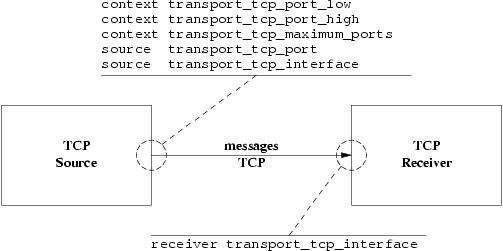4.6. Transport TCP Network Options
TCP receivers initiate connections toward TCP sources. Messages flow from sources to receivers.
transport_tcp_port_low is the lowest port that UMS will allocate for TCP sources in a context; transport_tcp_port_high is the highest. No more than transport_tcp_maximum_ports ports will be assigned to TCP
sources within a single context.
Creation of a UMS source on a TCP transport will allocate
an unused port from the range if less than transport_tcp_maximum_ports ports have already been
allocated. Setting transport_tcp_maximum_ports to a fraction of the range
allows the corresponding multiple number of UMS processes to
share a common configuration.
If a particular TCP port is desired by a source, it may be given with transport_tcp_port. If the desired port is already in use,
then an unused port will be sought as described above. A value of 0 (the default) expresses no preference and results in the default
open port seeking behavior described above.
transport_tcp_interface may be used on TCP sources to choose
particular interface, overriding the default INADDR_ANY which
accepts connections on all interfaces. Similarly, transport_tcp_interface may be used on receivers to choose a
particular interface for outgoing connections.
4.6.1. transport_tcp_interface (receiver)
Specifies the network interface to which UM receivers bind before connecting to sources. You can specify the full IP address of interface, or just the network part (see Specifying Interfaces for details).
4.6.2. transport_tcp_interface (source)
Specifies the network interface over which UM accepts connection requests (from topic receivers). You can specify the full IP address of interface, or just the network part (see Specifying Interfaces for details). Be aware that this option is applied to the transport session when the first topic is created on that session. Thus, setting a different interface for a subsequent topic that maps onto the same transport session will have no effect. Default is set to INADDR_ANY, meaning that it will not bind to a specific interface. You can also modify the default by setting the option to 0.0.0.0/0 which produces the same result.
4.6.3. transport_tcp_maximum_ports (context)
Maximum number of TCP sessions to allocate.
4.6.4. transport_tcp_port (source)
The preferred TCP port number for this Topic. If 0, the context will attempt to find one in the given TCP port range.
4.6.5. transport_tcp_port_high (context)
High port number to assign TCP sessions to.
4.6.6. transport_tcp_port_low (context)
Low port number to assign TCP sessions to.
